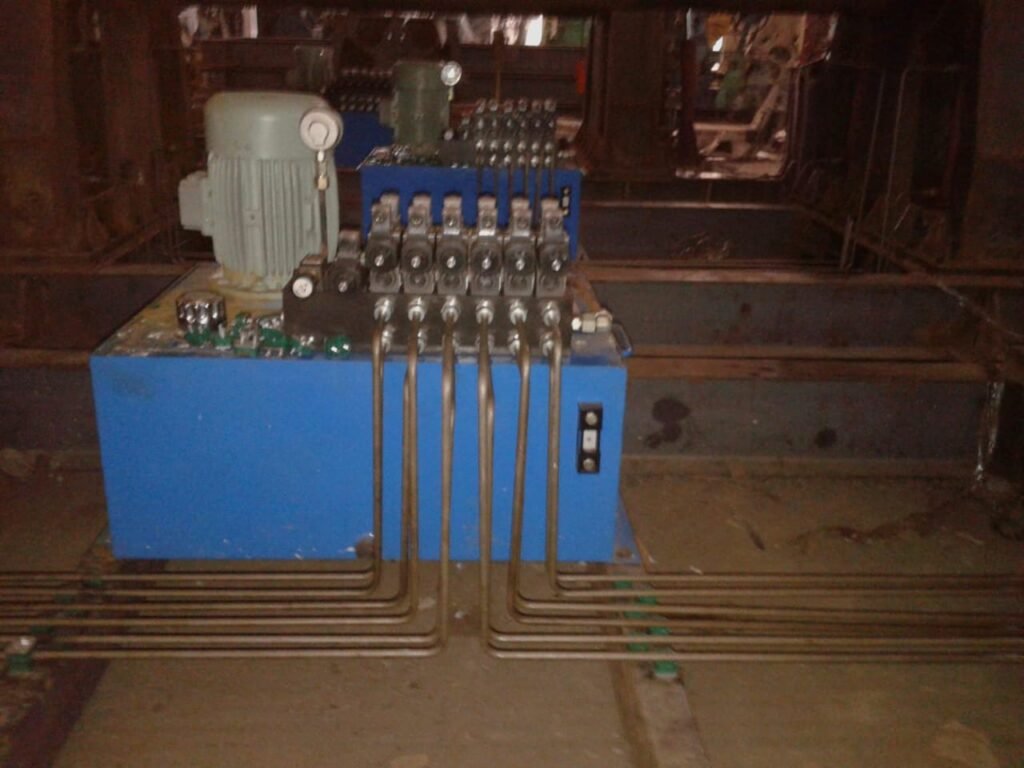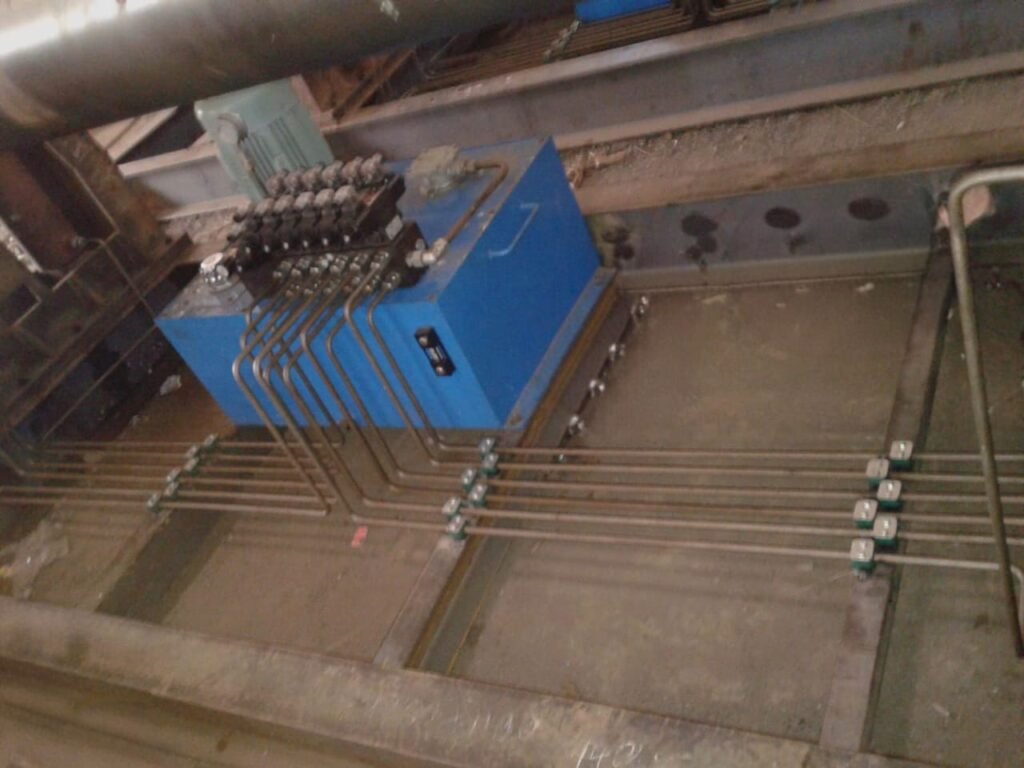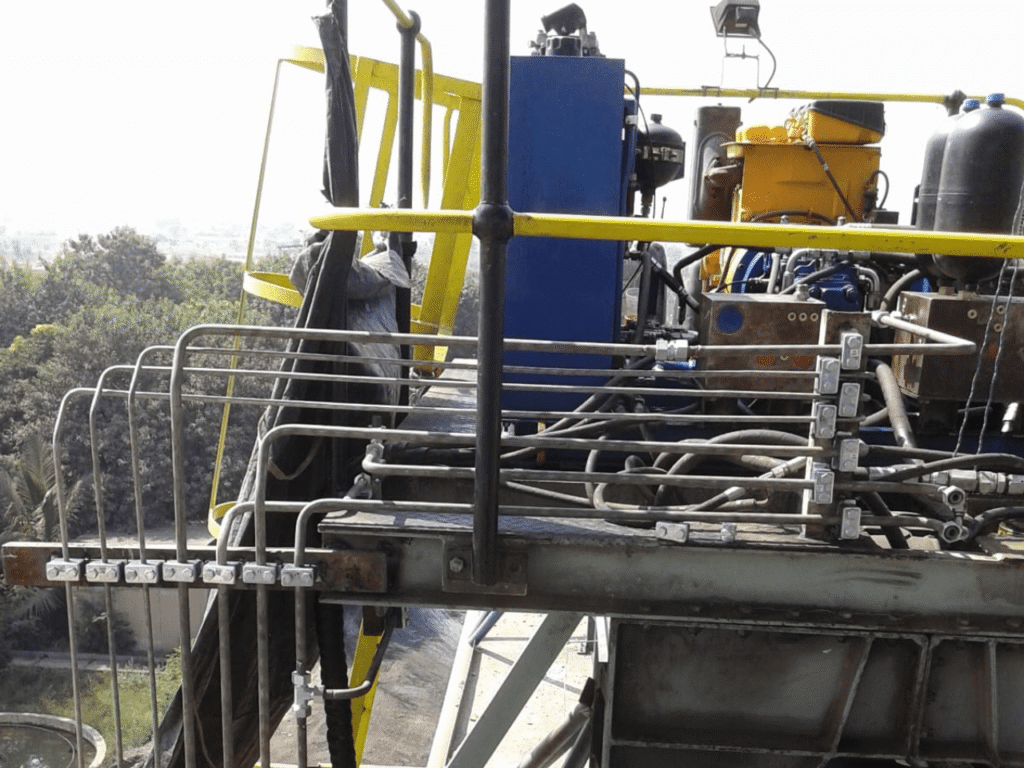
In addition, we provide services for product delivery and installation, and our team is prepared to respond to your questions as quickly as possible. To save time and money, take advantage of our creative cost-saving solutions by contacting us right now.
Comprehensive Guide to Industrial Machinery: Understanding the Tools that Drive Modern Manufacturing



Hydraulic piping work involves installing, maintaining, and repairing the piping systems that transfer hydraulic fluids in industrial applications. This includes connecting pumps, valves, and actuators, ensuring proper fluid flow, and preventing leaks. It’s a critical aspect of fluid power systems, ensuring precise control and movement in various industries.
What it is:
Fluid Power Transmission: Hydraulic piping systems are essential for transferring hydraulic fluid, which is used to generate force and power movement.
Components: These systems typically include pipes, hoses, tubes, and fittings, all designed to withstand high pressures.
Applications: Hydraulic piping is used in various industrial settings, including hydraulic power units, actuators, control valves, and pipelines for oil and gas.
What it includes:
Installation: Setting up the piping network, connecting components, and ensuring proper connections.
Maintenance: Regularly inspecting and maintaining the system to prevent leaks, ensure proper fluid flow, and identify potential problems.
Repair: Addressing any leaks, damage, or malfunctions in the piping system.
Precision Engineering: Ensuring accurate connections, proper fluid flow, and optimized performance.
Seal Integrity: Maintaining the integrity of seals and connections to prevent leaks.
Customization: Adapting the piping system to meet specific application requirements.
Durability: Selecting materials and designs that can withstand the rigors of industrial environments.
Key Considerations:
Material Selection: Choosing appropriate materials for the pipes, hoses, and fittings based on the type of fluid, pressure, and operating conditions.
Connection Types: Utilizing various fitting options like ferrule fittings, cold-formed fittings, and compression fittings to ensure secure and leak-proof connections.
Pressure and Flow Rates: Ensuring the piping system can handle the required pressure and flow rates without compromising integrity.
Safety: Adhering to safety standards and procedures to prevent leaks, spills, and other hazards.
In essence, hydraulic piping work is a specialized area that requires expertise in fluid dynamics, piping systems, and industrial practices to ensure reliable and safe operation of hydraulic systems.
Key Benefits of Hydraulic Piping
1. Efficient Power Transmission
Hydraulic piping offers a highly efficient means of power transmission. Hydraulic systems are the best in transmitting significant amounts of force through the hydraulic fluid, enabling the smooth operation of heavy machinery and equipment effectively. This efficiency is of paramount importance in industries where power and force are critical for various operations.
2. Precise Control
One of the key advantages of hydraulic piping is its ability to provide precise control over movements and operations. By skillfully regulating fluid flow and pressure through valves, hydraulic systems can achieve accurate and controlled motions. This precision makes them ideal for applications requiring exactness, such as in robotics, manufacturing, and aerospace industries.
3. Compact Design
Hydraulic piping systems can be designed in a compact and space-efficient manner. The capability to transmit substantial power through relatively small components allows for the creation of streamlined hydraulic systems. These compact designs are versatile and fit well into various equipment and machinery configurations, optimizing the use of available space.
4. High Reliability
Hydraulic piping systems are renowned for their robustness and reliability. With fewer moving parts and reduced wear and tear, hydraulic systems tend to have longer service lives. This reliability translates to increased uptime and reduced maintenance costs, providing businesses with more productive and cost-effective operations.
5. Safety Features
Safety is a top priority in hydraulic piping systems, and they can be equipped with essential safety features. Pressure relief valves are an example of such safety mechanisms, preventing overloading and potential accidents. By safeguarding against excessive pressure buildup, these safety features contribute significantly to the overall safety of operations in industries where hydraulic systems are deployed.
Conclusion:
In conclusion, hydraulic piping plays a vital role as the circulatory system of hydraulic systems in numerous industries. Its ability to efficiently transmit hydraulic fluid and power enables industries to achieve remarkable feats in manufacturing, construction, aerospace, agriculture, transportation, and more. Hydraulic piping’s precise control, compact design, high reliability, and incorporation of safety features make it a preferred choice for applications where force, accuracy, and efficiency are crucial. As technology and engineering continue to advance, hydraulic piping will likely remain an indispensable component, powering industries and driving progress for years to come.
| Details | Description |
|---|---|
| Compressor | Panasonic, Emerson, Coplanend |
| Condensor | Tube In Shall, Tube in Tube, PHE, Shall and Tube (SS, Copper, Titanium) |
| Axial Fan | Hicool, EBM |
| Expantion Valve | Denfoss, Sanhua, Emerson, Electronic Expansion valve |
| Evoprator | Hydropilic Aluminium foil and internal thread copper pipe heat exchenger |
| 4 Way Valve | Sanhua |
| High and Low Pressure Switch | Emerson, Denfoss |
| High and Low Pressure Gague | Micro |
| Controler | Touch screen controler |
| Body Material | MS and GI Sheet Powder Coated |
| Usage/Application | 10 to 85 Degrees in any hot water requirement |
| Rated Input Power | 1kw to 100 kw |
| Rated Output Heating Capacity | 3.7kw to 200kw |
| Rated Capacity | 80 LPH to 10000 LPH |
| Minimum Temperature | Up to 10 degrees |
| Maximum Temperature | Up to 85 degrees |
| Dimensions | As per Capacity |
| Weight | As per Capacity |
| Power Supply | As per Capacity (1 & 3 phase, 50Hz, 230V & 415V) |
WhatsApp us
We are looking forward to start a project with you!
We are looking forward to start a project with you!
Shed No. 42, Colin Industrial Park, Behind Bahuchar Party Plot, Near Shwetayan Industrial Park, Kathwada-Singarawa Road, Ahmedabad, Gujarat, India - 382430